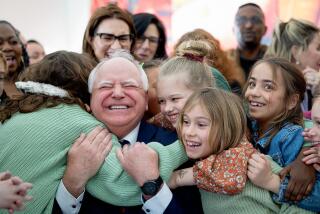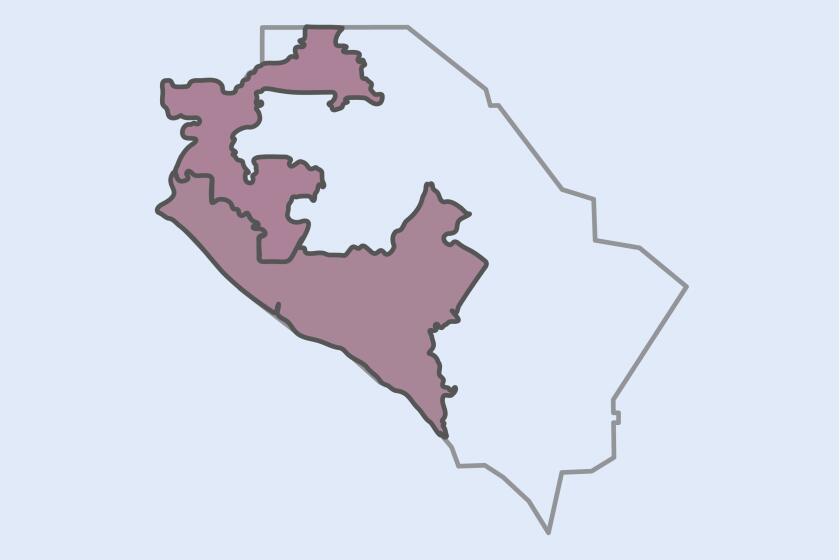Demos Look South to Rebuild Balance
WASHINGTON — The membership drive of the Democrats’ anti-Jackson club has been waning, especially after Wisconsin. Southern and conservative leaders who might have signed up are now reconciled to the remaining primaries taking their course. While there may be the odd off-the-record quote or a slow Colorado caucus count, party leaders recognize that a nasty fight with Jackson will damage the party’s chances in the fall. Accordingly, their interest has now shifted to influencing the second spot on the ticket by encouraging the party’s super-delegates to endorse a vice presidential candidate before the end of the primary season.
While party leaders will have to live with Massachusetts Gov. Michael S. Dukakis--or now long-shot Jesse Jackson--as the presidential candidate, they cannot stomach both on the ticket. Two liberals would add up to the kiss of death. Consequently, they are promoting one of two candidates for vice president--Sen. Sam Nunn of Georgia or Sen. Lloyd Bentsen of Texas. Other names mentioned are former party chairman Robert Strauss and Sen. Robert Graham of Florida.
Nunn’s name as a vice presidential candidate is being quietly pushed by Rep. Beryl F. Anthony Jr. of Arkansas, the head of the Democratic Congressional Campaign Committee. For Anthony, Nunn is a virtue born of necessity. One of Anthony’s main tasks at the committee is to ensure that Southern Democrats hold their seats in 1988. He remembers that Walter F. Mondale’s 1984 presidential defeat also meant the loss of three incumbent House seats in Texas, three in North Carolina and one in Georgia.
In 1988, Southern House Democrats are again vulnerable. As a vice presidential nominee, Nunn can offer the regional insurance that Southern candidates require. Anthony is a smart politician; he wants no part of a “stop Jackson” or “stop Dukakis” movement. But he will insist that the No. 2 slot goes to a Southern moderate who can help other candidates where most help is needed at state and local levels.
A Nunn or Bentsen would give a liberal ticket ideological balance--and strength. Both Dukakis and Jackson would need to pull in votes from the Democrats’ conservative wing that has gone to Reagan in the last two elections. Nunn’s knowledge of defense and foreign-policy issues would counter Republican charges that Democrats are weak in these areas. His Georgia roots and name identification would add votes to a party that has not won the White House without a Southerner on the ticket in 40 years.
Texan Bentsen (who can run for both the Senate and vice presidency) also brings conservative credentials and a big electoral state.
Promoting a vice president before a presidential nominee has been selected may pose problems, but not as many as would a Dukakis and Jackson ticket. That would be a case of forming a liberal firing squad--in a circle.
Without a moderating Southerner--one who has Washington experience and who supports a tough foreign policy--the Democrats would once again be writing December post-mortems to explain why they lost.
The movement toward a Southern conservative on the ticket is a shrewd idea. The talk at this late stage of a brokered convention and a draft of New York Gov. Mario M. Cuomo is like casting Hamlet without the prince of Denmark. Party leaders realize that the presidential selection process is now out of their hands. The focus shifts to building the coalition needed to win in the general election.
By endorsing a candidate before the end of the primary process, party leaders and super-delegates can get on the record early for a vice presidential choice, thereby avoiding pressure that will surely come from the camp of a second-place candidate.
Given a nominee from the liberal wing of the party occupying the top position means representing the rest of the party in the second spot--meaning someone very much like Nunn or Bentsen. That is, if the Democrats intend to win this fall.
More to Read
Get the L.A. Times Politics newsletter
Deeply reported insights into legislation, politics and policy from Sacramento, Washington and beyond. In your inbox three times per week.
You may occasionally receive promotional content from the Los Angeles Times.










